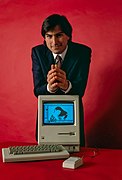The Internet PortalThe Internet (or internet) is the global system of interconnected computer networks that uses the Internet protocol suite (TCP/IP) to communicate between networks and devices. It is a network of networks that consists of private, public, academic, business, and government networks of local to global scope, linked by a broad array of electronic, wireless, and optical networking technologies. The Internet carries a vast range of information resources and services, such as the interlinked hypertext documents and applications of the World Wide Web (WWW), electronic mail, telephony, and file sharing. The origins of the Internet date back to research that enabled the time-sharing of computer resources and the development of packet switching in the 1960s. The set of rules (communication protocols) to enable internetworking on the Internet arose from research and development commissioned in the 1970s by the Defense Advanced Research Projects Agency (DARPA) of the United States Department of Defense in collaboration with universities and researchers across the United States and in the United Kingdom and France. The ARPANET initially served as a backbone for the interconnection of regional academic and military networks in the United States to enable resource sharing. The funding of the National Science Foundation Network as a new backbone in the 1980s, as well as private funding for other commercial extensions, encouraged worldwide participation in the development of new networking technologies and the merger of many networks using DARPA's Internet protocol suite. The linking of commercial networks and enterprises by the early 1990s, as well as the advent of the World Wide Web, marked the beginning of the transition to the modern Internet, and generated sustained exponential growth as generations of institutional, personal, and mobile computers were connected to the network. Although the Internet was widely used by academia in the 1980s, the subsequent commercialization in the 1990s and beyond incorporated its services and technologies into virtually every aspect of modern life. (Full article...) Selected article"Bale Out: RevoLucian's Christian Bale Remix!" is a satirical dance remix by American composer Lucian Piane, also known as RevoLucian, released on February 2, 2009, to YouTube and Myspace. The piece utilizes audio from a July 2008 rant made by actor Christian Bale on the set of Terminator Salvation. Various other elements are used in the remix, including pulsating dance track beats and clips of Barbra Streisand from a 2006 exchange with a supporter of then-President George W. Bush, creating the impression of Streisand arguing with Bale. The day after its release, the YouTube page for the song had been viewed over 200,000 times, and over a million times by February 5, 2009. The Associated Press called it a "hypnotic dance track", and United Press International noted it was "catchy", characterizing it as a "YouTube sensation". Gil Kaufman of MTV.com described the piece as "a techno-ripping, demonic dance party". Time magazine's website called the track "hilarious", and Nine News characterized it as a "raging online success". The director of Terminator Salvation McG liked the remix and put a copy of it on his iPod, and Bale said he had heard the remix and thought "they did a good job". Selected picture The term Web server can mean one of two things: A computer program that is responsible for accepting HTTP requests from clients, which are known as web browsers, and serving them HTTP responses along with optional data contents, which usually are web pages such as HTML documents and linked objects (images, etc.). A computer that runs a computer program as described above. News
Wikinews Internet portal
WikiProjects
Did you know (auto-generated) -
Selected biography
Vannevar Bush (March 11, 1890 – June 30, 1974) was an American engineer and science administrator, known for his work on analog computing, his political role in the development of the atomic bomb, and the idea of the memex—seen as a pioneering concept for the World Wide Web. A leading figure in the development of the military–industrial complex and the military funding of science in the United States, Bush was a prominent policymaker and public intellectual ("the patron saint of American science") during World War II and the ensuing Cold War. Through his public career, Bush was a proponent of democratic technocracy and of the centrality of technological innovation and entrepreneurship for both economic and geopolitical security.
General images -The following are images from various internet-related articles on Wikipedia.
Selected quoteMore Did you know...
Main topics
Featured contentCategoriesRelated portalsThings you can do
Associated WikimediaThe following Wikimedia Foundation sister projects provide more on this subject:
Wikipedia's portalsDiscover Wikipedia using portals |
How Can We Help?























































Recent Comments